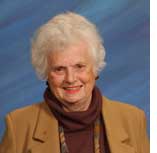|
By Natasha Josefowitz, Ph.D
 LA JOLLA, California—There are many advice columns for the newly married, for coping with a first child, for dealing with family and career, but I have not seen much written about the older marriage. LA JOLLA, California—There are many advice columns for the newly married, for coping with a first child, for dealing with family and career, but I have not seen much written about the older marriage.
Over the age of 65, almost twice as many men are married than women. This says something about our demography and the availability of potential partners. As a man grows older, his available pool of females grows larger; but as a woman grows older, her available pool of male partners grows smaller.
There are two kinds of marriages in our golden years: the couples that have lasted through youth and middle age and are now growing old together and the couples who are in a second, third, or even fourth relationship and are now dealing with extended family problems. Only 20 percent of first marriages make it to the golden years, yet being married is good for people’s health. There is less drinking, less smoking, better nutrition, and a wider circle of friends.
Some long-term marriages are happy as adjustments have been made to a different lifestyle and new life circumstances. Some long-term marriages are unhappy, but partners have stuck it out for a variety of reasons: from apathy to the unwillingness to break up the family, from religious reasons to disengagement that permits individual pursuits.
The important thing is to confront how different an older marriage has become from an earlier time. Are the cultural, ethnic, or religious factors that may have been swept under the rug making a reappearance?
New contracts may have to be discussed. What expectations does each have of the other—of the marriage itself? Is each person equally committed to the relationship? How is caring expressed? As is often the case, she tells him she loves him, but he doesn’t say it; instead he shows it. Do the partners validate each other? After so many years, there may be a tendency to take each other
Go to the top of right column
|
|
for granted. It is still important to say “You look handsome tonight,” “you were the life of the party,” “I always have so much fun with you,” “I’m always so proud of you,” etc. Compliments still have to be reiterated even after 50 years of marriage.
No matter what means of communication the older couple has been using to resolve conflicts, new situations are bound to arise that need new ways of coping. The larger issue, of course, is retirement. A couple that had a life outside of marriage is now thrown together, sometimes 24 hours a day. This will necessitate a major readjustment of daily activities, especially as people grow older and may be more set in their ways. Yes, older people have a tendency to become more rigid, relying on the familiarity of the known. It is easier to do things the way they were always done and difficult to learn new ways. Older people resist change even more than others and with the new technology coming at us rapidly, it is easy to see how an older person could become befuddled.
Inevitable losses will occur, such as impaired health, mobility, and problems with hearing or sight. Life transitions could include new living arrangements. Friends and relatives can become ill and some will die. New methods of collaboration with family and doctors need to be instituted. The worst of all is mental impairment of one of the spouses. Becoming a caretaker of a spouse increases stress. One of the issues to be dealt with is whether to stay in the old house or move to a retirement home. A house with stairs may become a problem. Transportation may be difficult if poor eyesight or slower coordination makes it
necessary to stop driving.
Retirement communities are a solution for many couples as it frees both partners up to spend more time together as they renegotiate priorities, responsibilities, and routines.
Yet, these may be the best years ever, with time for each other, for leisure pursuits postponed during the work years, for renewed friendships, travel opportunities, joy in grandchildren, and best of all, no pressure—no job demands. This is a time when one can indulge in the pursuit of fun and pleasure. The best predictors of this happening is good enough health and financial security. So eat right, exercise, and save so you will reap the rewards of that golden age.
|

